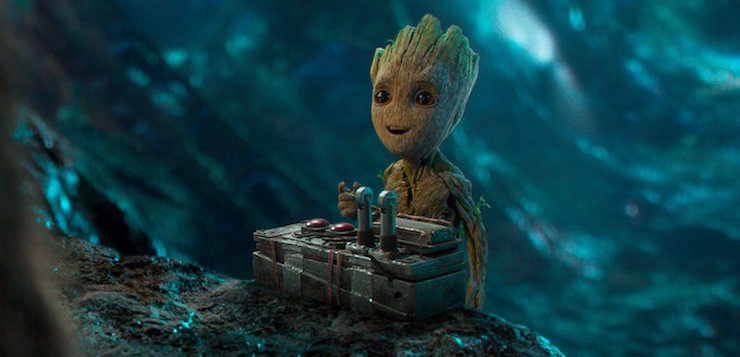Sequels are like second albums—hard to produce, even harder to produce well. Guardians of the Galaxy Vol. 2 is a textbook example of the challenge any creative endeavor faces when it’s sequel time: a massive commercial and critical success initially underestimated by everyone is something you only get to be once. The second time out, you have to deliver something new while building and riffing on everything that made the first movie a success.
Guardians of the Galaxy Vol. 2 does both these things, and also manages to directly address one of the MCU’s most persistent structural issues.
Volume 2 takes the idea of a chosen family and family ties to the next level. Almost every character is faced with familial issues, here, and are able to work through them in a wide variety of pairings. The ensemble cast of major characters has grown since Volume 1, and almost every double act we encounter works very well: Rocket and Yondu, Drax and new character Mantis, Quill and his father Ego, Gamora and Nebula.
This focus on relationships, and on exploring new perspectives on those relationships, ensures that the core of the movie is fundamentally emotional and character-driven. Along with the reunion of Quill and his father, we get a detailed exploration of Gamora and Nebula’s childhood, Drax’s isolation, Yondu’s past, and just what, exactly, Rocket Raccoon’s problem is. In fact, of all the characters, Gamora, Yondu, and Rocket are best served by this movie. For her part, Gamora is formally established as the team’s designated adult, and her emotional journey, begun quietly and almost in the background of the first movie, is made more overt here. Gamora is much more than just her past now, a woman who has made her life into what she wants it to be, not what she’s been handed. Her sister recognizing that change, and the effect it has on both women, is surprising, poignant and amongst the movie’s best scenes. Gamora was the character least well-served by the original movie; here she’s essentially a co-lead, and the film is far better for it.
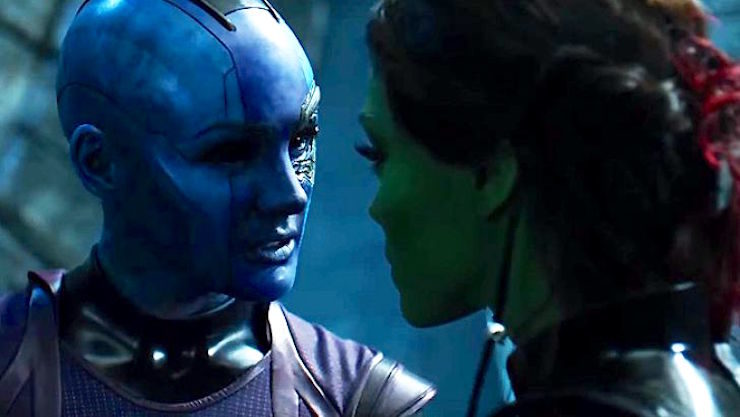
Yondu and Rocket are put under the spotlight, too, and neither find it a comfortable experience. Michael Rooker is one of the most effortlessly fun actors of his generation and happily, he’s given a ton to do. We find out quite a lot about Yondu—what he’s done, the price he’s paid, and the weight he carries as a result—all of which builds on and plugs into Volume 1 perfectly. Yondu is by no means a decent man, but he is a good one; seeing him come to realize that hits the viewer like an emotional hammer blow. This is arguably Rooker’s best work to date, and his performance is absolutely one of the things that will stay with you after the movie ends.
Rocket’s time in the spotlight places him somewhere halfway between Yondu and Quill. He shares Quill’s arrogance, mild-to-extreme incompetence, and inability to back down; he also has Quill’s vast loneliness, and the two cope with it in wildly different, equally bad, ways. Where Quill goes all in with his dad, Rocket pushes everyone away because he can’t face the risk of letting people in. That’s the common ground he shares with Yondu; they’re a pair of wounded outcasts who’ve cut every tie, only to find themselves terrified by the fact that people choose to stand with them anyway. It’s a brilliantly handled, often deeply moving characterization and performance, and Sean Gunn and Bradley Cooper do an incredible job with Rocket. Whether laughing uproariously during an ambush like the venomous trash panda he is or taking his first cautious steps towards emotional honesty, he’s a riveting character. As the end credits roll, you realize that it’s Rocket that’s truly travelled the furthest over the course of the last two hours. (It should also come as no surprise that Rocket and Yondu get the two best lines in the film…)
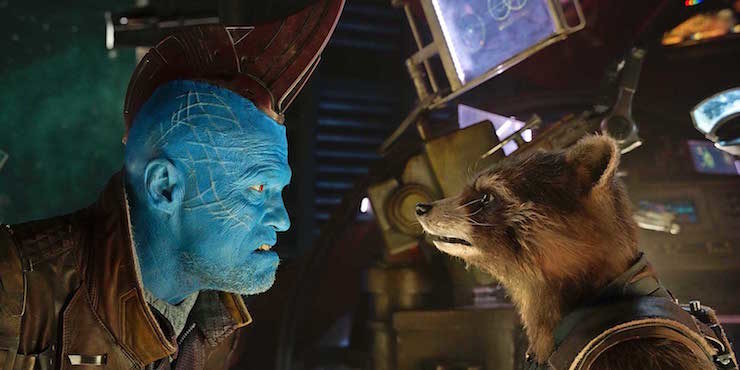
The two new major characters, Ego and Mantis, also impress. Kurt Russell as Ego is clearly having a fantastic time, and his combination of old school swagger and otherworldly charm gives the character added depth from the moment he first appears on screen. Pom Klementieff’s Mantis is also great fun—sweet and open in a way that complements Drax but gives her plenty of personality in her own right. To say any more about them would spoil the movie, but both are highlights.
Not everyone is quite so well served, however. Drax gets some nice moments, particularly with Mantis, but a lot of his jokes feel unusually mean-spirited. There’s context for why that is, and it makes sense, but if there’s a plotline that’s underdeveloped here, it’s surely Drax’s. Likewise, Baby Groot is adorable, but often isn’t much more than that. Also, a running gag involving him being angry at Drax again feels a bit mean rather than funny.
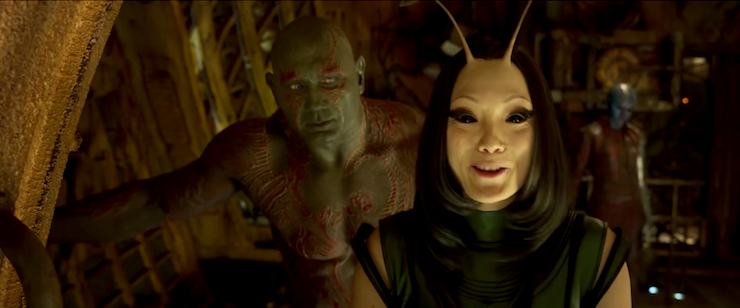
Peter Quill is oddly underserved, too, though not so much by the script but by the editing. The middle act of the film sees the team split three different ways. There’s some great stuff here, especially a wonderful bit involving Groot trying to organize a jailbreak, but it feels really choppy. You’re left with a definite sense that a lot has been left on the cutting room floor, and unfortunately much of that seems to have set up a more gradual character evolution for Quill. What we get is good, and Pratt has a pair of scenes with Russell and Rooker that are flat-out amazing, but his path through the movie feels disjointed. In particular, there’s a near-subliminal cameo from a Quill family member that suggests a lot of material didn’t make it to the screen, and the film suffers for that.
That being said, the sacrifice of a smooth ride for Quill gives us a really interesting movie. This is the most oddly-structured Marvel film since Iron Man 3, with the cast spending a large chunk of time apart while our focus is trained on anything but an impending cosmic threat. That threat does come, make no mistake—but the fact it takes a while to arrive only helps the story. It feels like an escalation rather than a last-second addition, and the film’s constant ramping of stakes, scale, and tension makes for a genuinely tense third act.
That’s an enormous relief, given Marvel’s occasional tendency to throw a lot of CGI at the final reel and turn it into a boss fight instead of a proper finale. That’s less common now than it was in the past—Doctor Strange and Civil War both had really strong final acts, after all, and this movie takes it even further. The strength, and structure, of Volume 2’s third act is a clear indicator that Marvel is finally starting to change their standard model. Along with everything else they need to do in the grand scheme of the MCU, it’s long overdue, but the improvement definitely seems to be happening, and it definitely works.
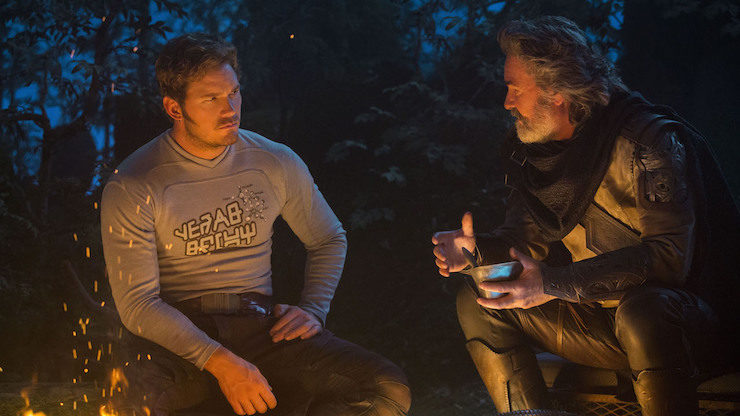
Finally, the direction and production are impressive, as well. The opening scene is huge fun, an exuberantly playful action sequence/musical number, and it’s just the first in a run of smartly handled action beats. There’s a pair of nicely burly crash sequences and a truly beautiful sequence on Ego’s world that looks like something out of The Metabarons. Moreover, the emotionally charged climax is also a smartly-handled multi-level action sequence that even has a nice throwback to the “Avengers Assemble” moment at the end of the first Avengers movie. Plus the actual ending is lovely, balancing the emotional payload of the previous scenes with spectacle, fitting character beats, and, of course, that mixtape, all to extraordinary effect.
Guardians of the Galaxy Vol. 2 is a difficult second album, with a lot riding on it. It’s also a very good second album. It successfully pushes its characters, its story, and the accepted wisdom of the colossal franchise of which it’s a part in interesting ways. The film is at its most effective when it does this, and tends to be least effective when it relies on the tired, overly familiar beats and approach to humour that characterize its weakest predecessors in the MCU. Thankfully, there’s far more of the former than the latter at play—meaning this is a mixtape that impresses, and will certainly stand up to repeated listens.
Alasdair Stuart is a freelancer writer, RPG writer and podcaster. He owns Escape Artists, who publish the short fiction podcasts Escape Pod, Pseudopod, Podcastle, Cast of Wonders, and the magazine Mothership Zeta. He blogs enthusiastically about pop culture, cooking and exercise at Alasdairstuart.com, and tweets @AlasdairStuart.










